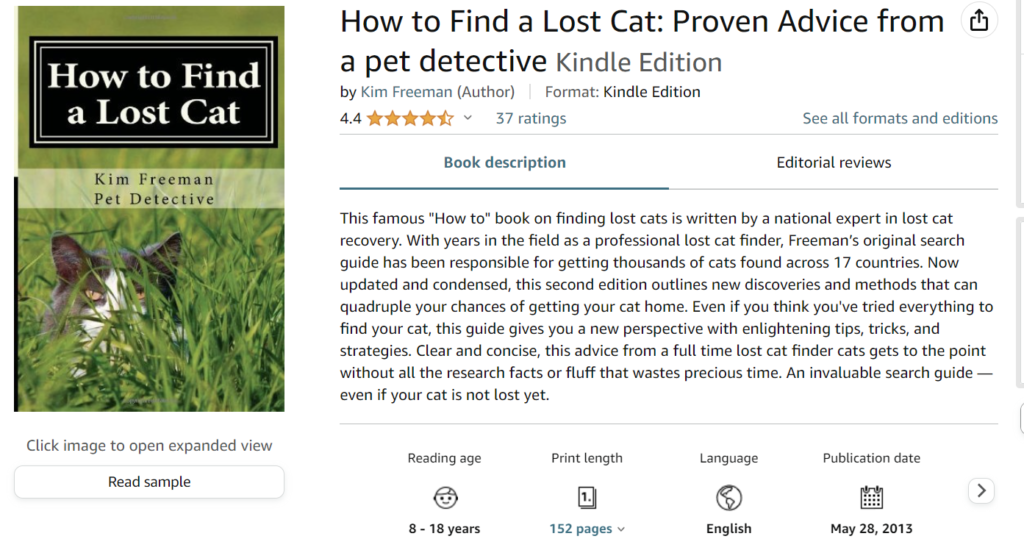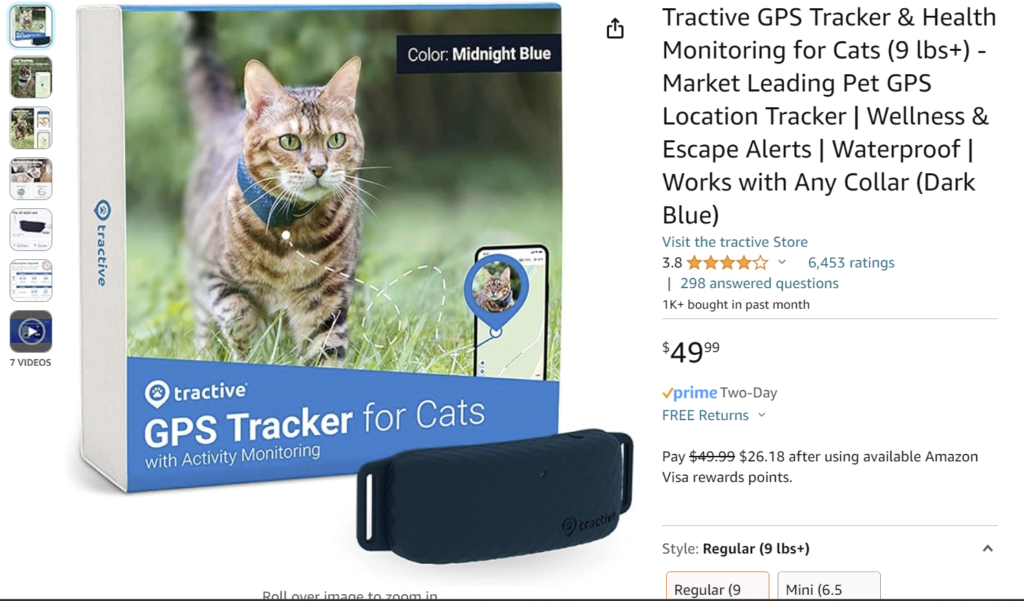
Many people recommend putting a dirty cat litter box outside the house to help a lost cat return home. Does this method work? Why or why not? Let’s take a look.
The cat litter box method is a very popular suggestion on the internet. Visit any lost pet social media page or message board and inevitably someone will give this advice. It goes something like this: Put your lost cat’s dirty litter box outside. Cats can smell it from a mile away and it will lead him back home.
I’d like to examine the elements of this method to see how it could work, and if not, which methods are more effective. Let’s start with a cat’s sense of smell.
How far can a cat smell?
Cats, like dogs and other animals, have olfactory senses many times better than that of humans. They live in a world we can only imagine. That said, over how far of a distance can they actually smell? Well … the answer is we don’t know. I did extensive research on this topic and could only find vague references claiming a cat can smell from 50 feet to 4 miles! That’s way too much of a variance to be factual. So while we know that cats can smell more and at longer distances than humans, we can’t say with certainty that they can smell for a mile or how all the other smells in that area would affect the thing you want them to smell, the litter box.

The reason I obsess on research is that there’s a lot of rubbish on the internet. Shocking, I know! But it’s true, and unfortunately a ton of misinformation gets shared and re-shared even by trusted authorities. I often cite the example of “1 in 3 pets will go missing in its lifetime.” Many websites cite this “statistic” yet there is no related study I can find and the statement is vague. What kind of pets? Dogs, cats, tortoises? In which city, state, country? If you want factual information you have to be very critical.
How many cats are actually lost?
The second factor to consider with the litter box method is how the cat is missing. Are they “lost” in the traditional sense, like Hansel and Gretel needing a trail of bread crumbs to lead them back home? While I don’t have an exact figure on this one, I have handled thousands of missing cat cases in shelters, rescues, and in my community and I can tell you that many, if not most, are not lost in this way. Many cats are hiding or stuck close to home or even in the home. Missing cats are found in sheds, garages, crawl spaces, cars, and in one case a piano!

More importantly, they may be stuck and in danger. My friend’s cat got accidentally shut in their car on a very hot day. Thank goodness her absence was noticed right away and she was freed from the vehicle before the temperature became fatal. Cats have died from lack of food and water when stuck under a house, in the ceiling of a business, or any other place where they are not discovered until too late. Cats will hide when sick or hit by a car, unable to return home even if they know where they are.
Many cats are considered “community cats,” going from one house to another visiting and eating. If your cats have outdoor access there is no way of preventing them from going to other people’s homes. I have seen disputes between neighbors as to who actually owns a cat, which is why microchipping is important. If you feed your cat grocery store brand kibble and the neighbor feeds Fancy Feast, a smelly litter box is not likely to entice him to return home!
Is the smell of urine and feces attractive?
The next question to ask is why, of all things, a dirty cat box would be attractive to a lost cat? Let’s say your cat really is lost. Maybe he wandered too far from his home territory, he was chased by a dog or another cat, or accidentally transported in a vehicle then let out in an unfamiliar place. If he could smell the box from his location, would it help him return home?
Again, there is no study on this particular subject, but I’m going to explore my general knowledge of animal behavior. How do cats feel about their waste material? Because we all have cat litter boxes, we know that cats like to bury their waste. Some cats are really particular and will dig to China in every direction until the poop is completely covered. Why do they do this?
The smell of feces can attract predators. Mom cats especially will hide waste material and even consume their kitten’s waste – yuck! – to avoid danger. A predator could kill her kittens and her when she is in a vulnerable position. For male cats, urine marks territory. Aggressive tom cats will spray as broadly as they can to tell everyone this is their territory. Another male crossing that boundary will likely be chased away or attacked. Most neutered males will urinate on the ground and cover it to hide the smell, avoiding trouble.
Overall, for cats urine and feces are something to be avoided, to be hidden, or an indicator of danger. They do not broadcast an invitation or offer any comfort to a cat, so are unlikely to be an attractant to a lost cat finding his way home.
Which smells will attract a lost cat?
Since cats do have a keen sense of smell, what could better be used as an attractant? An easy answer is wet cat food. My friend lost her cat and put out several small dishes of wet food around her home to draw him back. He was nearby hiding in the woods and this along with her sitting outside and speaking to him enticed him to return.

Strong smelling meat like Kentucky Fried Chicken is a secret weapon of cat trappers. I have heard stories of owners barbecuing food outside to entice a lost cat or dog to return home. So while using an attractive scent like food can get a cat’s attention, they still need to be close enough to smell it and to identify where it is coming from. When using a food lure, you must also take care to not attract unwanted animals like raccoons and skunks. You can lessen this possibility by putting food out only during daylight hours, or by sitting out and watching it at night like my friend did. It’s a conundrum because cats are naturally nocturnal, but so are all the other critters you don’t want coming around.
Confirmation bias
When I was doing consulting for animal welfare agencies I learned a lot about confirmation bias. We hear stories and “truisms” over and over and the repetition leads us to believe they are true. We also draw conclusions based on correlation versus causation, a subject often discussed by Dr. Deal Edell. In my early days of pet sitting before we had streaming entertainment and podcasts I enjoyed listening to his program on the radio. He was big on facts and the debunking of myths in his field.
For example, he’d say something like if you have a cold and you eat Cheerios every day, in seven days your cold goes away. Did the Cheerios cure you? No, but you could make a connection and believe that. Owners of lost cats put out the litter box and the cat returns, so they have “proof” even though the cat’s return could be due to one of many other possibilities.
What’s the harm?
Proponents of this method will ask what’s the harm? Why not pull out all the stops and try everything to find a lost cat? Well, there are some unintended consequences that could actually make it more difficult to find your cat.
As mentioned earlier, cats bury their feces because they can attract predators. A smelly cat box could bring coyotes, foxes, and other animals around your home, causing a nuisance and making it more difficult for your cat to return. The smell of urine could attract tom cats or aggressive neutered cats who will spray around it to mark territory, potentially frightening your cat from crossing that scent boundary.
More importantly, using the litter box, consulting a psychic, or relying on any one method only will significantly reduce your chances of success. Owners who find their lost pets do so because they cover all bases including physical search, using signs and flyers, and checking animal shelters. If you really believe the litter box will help, go ahead and put it out, but also take all other steps necessary to find your missing cat and get him back home.

